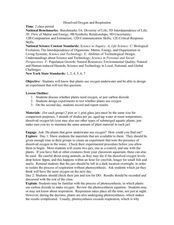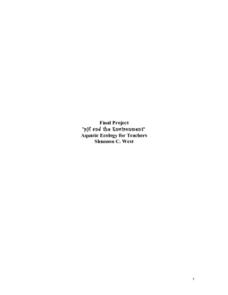Curated OER
Change Since 1609
Students recognize how the climate of the Hudson Valley has changed since the last glaciation. They explain these changes using a reconstruction of the land use changes in the Hudson Valley composed of confetti, Ziploc bags and other...
Curated OER
Dissolved Oxygen and Respiration
Students are presented with the question, "Do plants that grow underwater use oxygen?" They create an experiment to test the presence of dissolved oxygen in the water using provided materials. Student experiments include a control jar as...
Curated OER
Tides in the Hudson
Students view an illustration of the Hudson River watershed and identify the bodies of water shown. They discuss what happens when fresh and salt water mix. Students view a teacher demonstration of the stratification of fresh and salt...
Curated OER
Paleoclimate of the Hudson Valley
Students recognize how the climate of the Hudson Valley has changed since the last glaciation and be able to explain these changes. They reconstruct the paleoclimate of the Hudson Valley.
Curated OER
Eutrophication
Learners observe the effects of eutrophication and determine why it is harmful to aquatic ecosystems. They create mason jar ecosystems to observe the growth of algae in pond water. In addition, they observe the effect of introducing...
Howard Hughes Medical Institute
Seed Dispersal in Tropical Forests
How do seeds get around? It's not like plants can control seed dispersal—or can they? Dig deeper into the amazing mechanisms of seed dispersal observed in tropical plants through interactives, a video, and plenty of hands-on data...
Curated OER
Deer Tracks
Students use satellite images to track to movement patterns of deer and examine deer behavior. They write stories about a day in the life of a field scientist.
Curated OER
Studying Fossils
High schoolers hypothesize dinosaur size and speed by looking at dinosaur track way or by measuring a dinosaur models water displacement. In addition, techniques to help students become familiar with the ways paleontologists study...
Curated OER
"pH and the Environment"
Eighth graders experiment and study about acids and bases by becoming involved in direct hands-on learning experiences and then relate those experiences to their own lives. They experience the Ohio River and what can be done to help...
Curated OER
Cumulative Effects Assessment - What if?
Tenth graders discuss natural and human influences that may affect the ecological integrity of national parks. They study the concepts environmental assessments. In groups, they research a park's situation and present their findings at a...
Curated OER
The Formation And Types of Coral Reefs in Insular Southeast Asia and their Inhabitants
Students study the geological formation and inhabitants of the coral reefs in Southeast Asia. They investigate how the effects of weather and human activity on these ecological systems.
Curated OER
Creatures in Torch Lake
Students investigate pond ecology. They gather water samples from various sources, add grass, and let it sit for a week. Afterward, using microscopes, they identify the microorganisms present in the sample.
Curated OER
LIfe Underground
Students investigate the ecological relationship of worms and plants. They discuss the experiment of observing worms in a jar with plants. Then record the data every few days. The students write an imaginary story about their...
Curated OER
Recycling
Students answer questions on a survey regarding their participation in ecology. They then discuss their ratings, what they never do, and think up two more additions for the list.
Curated OER
Polar Food Web Comparison
Seventh graders practice the evaluation component of the scientific method while comparing and contrasting the similarities and differences of the food chains and webs of polar animal life. They study about classification and ecology...
Curated OER
Native American
Pupils investigate how early European exploration and colonization resulted in cultural and ecological interactions among previously unconnected peoples. They comprehend that Europeans had misconceptions about Native American literacy...
Curated OER
Activity Sheet: What Do You Do? Forest Ecologist
In this ecology worksheet, students read an interview with a forest ecologist before they act as an ecologist and spot the difference between two forest scenes on a black and white worksheet. They circle the wildlife and the clues left...
Curated OER
Help Save the Polar Bear
In this ecology awareness instructional activity, students read a poem written on a polar bear's tummy that tells how changing light bulbs and saving energy will help save the polar bear and then color the bear. Students color 1 picture.
Curated OER
Global Change — Change and Cycles Where Land, Air and Water Meet
Students participate in an experiment to define a parts-per-billion solution. In this ecology lesson, students select a second substance to create a parts-per-billion solution and observe and record their results. Students work in groups...
Curated OER
Mussel Movements
Young scholars consider the impact of invasive species on local environments. In this ecology lesson plan, watch the video, Arizona Wildlife Views, which focuses on invasive species. Students develop vocabulary, relate to meaningful...
Curated OER
The Efficient City
Students research and create a realistic plan for energy efficiency. In this investigative lesson students answer questions and fill out a worksheet on energy.
Curated OER
Plugged in to CO2
Students use a meter to measure the energy used and carbon produced by electronics and appliances. In this environmental science and technology lesson, students use a Kill-A-Watt meter to determine the electricity used by everyday...
Curated OER
Carbon Footprint Estimator
Learners discover what a Carbon Footprint represents. In this sustainable lifestyle instructional activity, students determine their Carbon Footprint as an individual and as a class. Learners use a the Internet to calculate how many...
Curated OER
Reducing Your Carbon Footprint to Help the Environment
Students examine their environment. In this carbon footprint lesson, students look at how he/she impacts their environment with the waste they create and the energy they use. As a class they read an article and listen to podcasts on how...
Other popular searches
- Population Ecology
- Animal Ecology
- Human Ecology
- Behavioral Ecology
- Ecology Principles
- Community Ecology
- Pond Ecology
- Ecology Organizations
- Global Ecology
- Ecology Ethics
- Ecology Food Webs
- Ecology and Plants

























